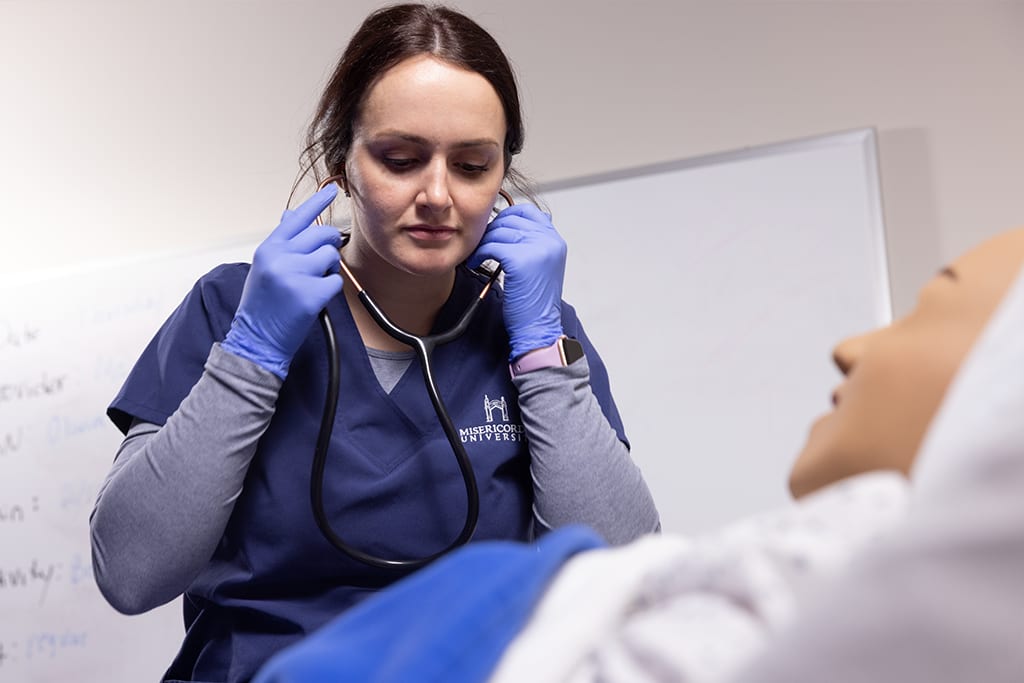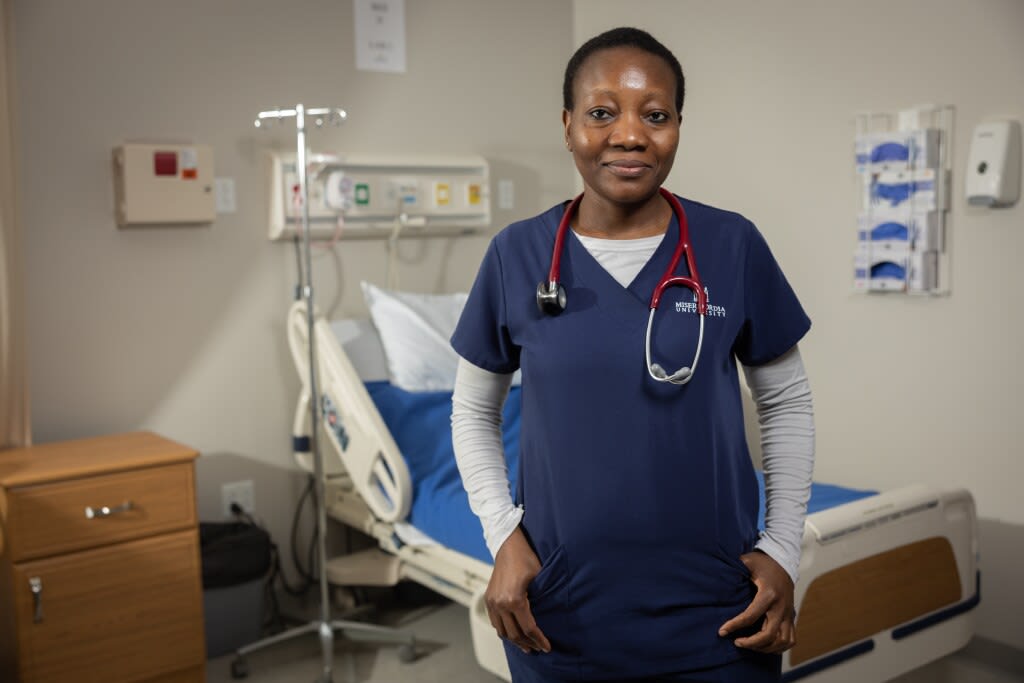How to Choose a Nursing Program: 6 Factors to Consider when Applying
Each blog post is dated and contains accurate information as of that date. Certain information may have changed since the blog post publication date. If you would like to confirm the current accuracy of blog information, please visit our ABSN overview page or contact admissions at (866) 885-6337.
When considering how to choose a nursing program, the most important factors include: accessibility, a rigorous curriculum, accreditation, program success, and student support. It’s also beneficial to consider an ABSN program that offers multiple start dates, online learning, and no entrance exam — like the accelerated program at Misericordia University.

You’ve recently decided to change paths to nursing, a personally rewarding and professionally lucrative career path. A great first step in making that happen involves pursuing an educational path that maximizes your time and investment.
Are you wondering how to choose a nursing program? With so many nursing programs out there, how do you even begin to narrow down your nursing school search? Start by knowing what to look for in a nursing school and how to find the right fit for you.
The biggest factors to consider include a program’s accessibility, curriculum standards, accreditation status, and commitment to student success. Misericordia University’s ABSN program in Pittsburgh has high marks in all these criteria.
In this blog post, we’ll explain six factors to consider when researching nursing schools and delve into why each of them matters in the context of your future nursing career. We’ll also explain why the Misericordia ABSN may be the best fit for you if you’re looking for an accessible, accredited program with a reputation for academic excellence and supportive faculty and staff.
1. Multiple Start Dates
For the reasons listed above, there are often more applicants for nursing school programs than there are seats available. Some traditional university nursing program only start students once (maybe twice) per year. With the current demand for nurses, this can lead to a backlog of nursing school applicants.
Meanwhile, Misericordia ABSN has the capacity to enroll more qualified students more often throughout the year. Because we offer three start dates per year — in January, May and August — we don’t have a waitlist. That means qualified students have the opportunity to start classes when they want to start, not just when there’s an opening. Then they can complete their nursing degree in as few as 16 months.

2. No Entrance Exam
Along with good grades, a common requirement for acceptance into a nursing program is passing an entrance exam. While these assessments are intended to demonstrate your aptitude for success in any given program, they do present an extra hurdle to jump over on your path to becoming a nurse.
While you need to meet specific academic requirements to qualify for the Misericordia ABSN, unlike some other nursing programs, the Misericordia ABSN does NOT require prospective students to complete any entrance exams or submit any personal statements or resumes as part of the application process.
Misericordia ABSN takes a holistic admissions approach. If you have a 2.75 GPA and complete the prerequisites, it’s a simple process.
-Ken Johnson, a Misericordia ABSN admissions counselor
3. Transfer Student Acceptance
You may be pursuing a BSN from any number of avenues. Perhaps you’re in a pre-nursing bachelor’s degree program at your institution but are stuck on the waitlist to begin its BSN program. Or maybe you’re in the middle of pursuing another non-nursing bachelor’s degree, but you discovered you actually want to become a nurse instead but feel obligated to complete your degree to qualify for enrollment in an accelerated BSN program.
Those aren’t concerns for prospective students with the Misericordia ABSN program. As long as you have completed a minimum of 60 credits from a regionally accredited institution within the specified minimum grade requirements, you’re eligible to apply to our program.
4. Rigorous Curriculum
One of the end goals of any quality BSN program should be how well it prepares you to sit for and pass the National Council Licensure Examination (NCLEX), the licensure exam that determines if you can practice as a registered nurse. The Misericordia accelerated nursing curriculum offers a solid mix of online and onsite instruction taught by experienced, highly supportive faculty to help you do just that.

Online Learning
It’s a common misconception that online-based education is somehow less rigorous than a traditional BSN program taught in a classroom. In the Misericordia ABSN program, nothing could be further from the truth.
The computer-based portion of our curriculum developed by top instructional designers to meet the rigorous curriculum standards set forth by the American Association of Colleges of Nursing matches the same level of rigor and quality of classroom-based nursing theory coursework. How nursing concepts are presented is what makes the difference, and this can benefit you no matter your preferred learning style.
For example, while traditional education resources like textbooks and lectures are still an important component of the Misericordia ABSN curriculum, innovative elements such as patient care scenarios and 3D animations with advanced graphic design elements make it easier for nursing students who are visual learners to recall the information in class and in the field.

Interested in learning more? Here’s what you need to know about online nursing education.
5. Nursing School Accreditation
If you’ve researched anything about what to look for in a nursing school, you’ve likely come across information about approval and accreditation and wondered what they are and why they matter.
What is nursing school approval and accreditation?
When considering where to pursue your nursing education, keep in mind there are differing levels and types of accreditations for academic institutions and that one does not ensure the other:
- Institutional accreditation refers to an entire institution meeting a set of standards designated by an accrediting body.
- Programmatic accreditation refers to a specific program within an academic institution meeting certain criteria such as faculty qualifications, course content and program quality.
What accreditations should a nursing school have?
While several national accrediting bodies exist, six regional accrediting agencies oversee academic institutions within their particular geographic areas. Misericordia University is regionally accredited by the Middle States Commission on Higher Education (MSCHE).
On a programmatic level, the U.S. Department of Education has approved two primary bodies that accredit general nursing education:
- Accreditation Commission for Education in Nursing (ACEN), which accredits all levels of nursing education from LPN to clinical doctorate.
- Commission on Collegiate Nursing Education (CCNE), a branch of the American Association of Colleges of Nursing, which accredits bachelor’s, master’s and postgraduate-level nursing programs.
Misericordia’s baccalaureate degree program is accredited by the Commission on Collegiate Nursing Education and approved by the Pennsylvania State Board of Nursing.
6. Student Support Resources
No matter what type of program you choose, nursing school is a notoriously intense experience for most students. Finding a program that offers built-in support resources can make the whole process — from getting admitted to adjusting to the coursework to staying motivated throughout the 16 months — that much more manageable.
Between admissions counselors, dedicated faculty, faculty advisors, and success coaches, the Misericordia ABSN program is well equipped with dedicated staff to help you succeed on your nursing journey.

Admissions Counselors
Even deciding where to earn your BSN can induce stress, a fact that is not lost on Misericordia ABSN’s dedicated team of admissions counselors. Their job is to help prospective students determine if they’re a fit for our program, and if so, to help them determine the best time to start their accelerated nursing education and create a plan to make it all happen.
Dedicated Faculty and Faculty Advisors
Even in programs that offer an online component, plenty of face-to-face support from faculty and instructors is a great characteristic for a nursing school to have. You want to know that if you’re struggling with a tough nursing topic, you have someone to reach out to for clarification and guidance.
Misericordia ABSN nursing faculty and clinical instructors are available in myriad ways. You can reach out to them by participating in instructor chat sessions on our e-Learning platform, emailing, calling, or stopping by their office at our nursing learning center in Robinson Township.
Success Coaches
Separate from faculty advisors, Misericordia ABSN success coaches are there to help you brainstorm solutions to any issues you encounter in nursing school. Their job is to assist you with study strategies, serve as a sounding board for any anxiety you encounter in the program, and help you achieve success in nursing school. Think of this person as your accelerated nursing school cheerleader.
The Right Fit for YOU
All other measures of quality aside, when choosing a nursing school, ultimately it comes down to which one feels like the best fit for you and your needs. If you’re looking for an accredited, online-based accelerated nursing program to fast-forward into the profession, the Misericordia University ABSN program may be exactly what you’re looking for.
To see if you are a good match for our program, complete this form to have an admissions counselor contact you.
